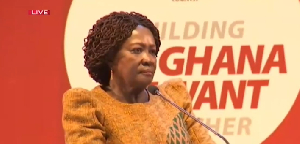Opinions of Saturday, 13 March 2010
Columnist: Sam, Kuuku
Celebrating The 100th Birthday Of F. L. Bartels
A Century Of Greatness- Celebrating The 100th Birthday Of F. L. Bartels
Now praise we great and famous men,
The fathers named in story;
And praise the Lord, who now as then
Reveals in man His glory.
William G. Tarrant (1853-1928)
The words of P K Arhin, the then School Prefect, at the 1956 speech day summarize the great life that has been lived by this great old man.
“Great was our joy not only because we as a school had thereby been honoured. We know how deserving our Head is of that honour; we know his efficiency; we know his sense of mission and his sense of responsibility; we have felt the warmth and glow of his interest and concern for us and the devotion to duty which animates him. We are glad of the opportunity of recording not only our congratulations, but also our thanks. We pray for him a long life in which he will give more and more unstinted service. We in turn pledge to him our dutiful cooperation in the future.”
Mr. Bartels is a celebrated educationist and a prolific writer. He was also an international civil servant, journalist, diplomat and lay preacher of the Methodist Church in Ghana.
In the beginning …
Born on Barnes Hill in Cape Coast on the 13th March, 1910 Francis LudowicBartels started his education at the Cape Coast Methodist Primary School in January, 1915. This was where he began his extraordinary educational career. F. L. Bartels, as he is affectionately called, was the best pupil in every primary class except one. He recounts in his book, ‘The Persistance of Paradox- Memoirs of F. L. Bartels’ , that in 1923 he deliberately had to come second in order to avoid name-calling by the big bullies in his class.The young Francis Bartels sat the entrance examination at Mfantsipim in December, 1924 coming second. This earned him a scholarship of reduced tuition fees. He entered Mfantispim School in January, 1925. At Mfantsipim, his performances were exceptional earning him five prizes and the Best Scholar award in his final year. In 1928, he was the only one out of thirteen students to have passed French with ‘credit’ in the School Certificate Education. He also earned an exemption from the matriculation of Oxford, Cambridge and London universities.
After Students Days at Kwabotwe
In January, 1929, he was the only student of the post-secondary class at Wesley College. Francis Bartels was also useful outside the classroom. In 1930, in his second year, he became the college organist. After his teacher training education, Bartels was awarded a King Edward VII Scholarship for his undergraduate education at the University of London.He arrived in England in September, 1931 to start his studies at King’s College. In 1935, he obtained his first degree.
Back to Bataan
Soon after returning from England, Mr. Bartels joined the staff at Mfantsipim. He was appointed the Senior Housemaster in charge of the Boarding Department aside the teaching of English and Physical Education. In 1942, he was promoted to the post of Assistant Headmaster of Mfantsipim School. That same year, hestarted acting as Headmaster until 1945.
With the vision of heading Mfantsipim in future, Mr. Bartels left Gold Coast in May, 1946 to train as a professional teacher. He enrolled for the Teachers’ Diploma Course at the London University’s Institute of Education. In the following year, he completed the diploma. The British Council having renewed his scholarship, he started his Master’s degree. Interestingly, he researched into the Fante language.From 1948 to 1949,he was a William Paton fellow and lecturer at the Selly Oak Colleges in Birmingham in the Midlands of the United Kingdom.During this period, he completed his Master of Arts thesis and was awarded an MA degree with the mark of distinction.
Breaking the colour bar
In October, 1949 F. L. Bartels broke both the “colour bar” and the “collar bar” by becoming the first black layman to be appointed as Headmaster of Mfantsipim.It was during his tenure of office that the 6th Form programme at Mfantsipim began.Mfantsipim overcame the initial struggle to become a first class sixth science school. He also introduced an examinable course in Current Affairs which is still a dominant feature on the school’s timetable. In 1956, Her Majesty, Queen Elizabeth II conferred on him the award of Officer of the Most Excellent Order of the British Empire. This was in recognition to his contribution to education. He was made Conference of Heads of Assisted Secondary Schools (CHASS) in 1957 having resigned as Secretary eighteen months earlier. F. L. Bartels left Mfantsipim in 1961 to join UNESCO.
International Service
A series of events led F. L. Bartels to UNESCO. He left Ghana on 4th July, 1957 for the United States on a Leader Grant Award that enabled him to visit a number of higher institutions. While there, he accepted an offer from the World Confederation of Organisations of the Teaching Profession (WCOTP) as a consultant on a programme for strengthening teachers’organisations in Africa. This gave birth to another opportunity which ended him at United Nations Educational, Scientific and Cultural Organisation (UNESCO). F. L. Bartels started work at UNESCO on 17th April, 1961 as Programme Specialist for Teacher Training. In October, 1963 he was promoted to the post of Chief of the Africa Division of UNESCO. In September, 1967 he was promoted to the post of Adviser on African Education to the Assistant Director-General for Education. F. L. Bartels left the UNESCO offices in Paris on 19th December, 1969.
Higher Education Lecturership
In December, 1969 Mr. Bartels took up the appointment of Senior Lecturer at the University College of Nairobi. Prior to that, he had been a Visiting Lecturer at the Institute of Social Studies between 1961 and 1967. He was also Visiting Lecturer at the University of the Pacific, Stockton, California in the summer of 1968. He taught English and Phonetics from 1973 to 1978 at the Sorbonne, Paris IV. F. L. Bartels also worked as an educational consultant at a number of universities in Africa during this period.
Your Excellency …
On 1st May, 1970 Bartels was appointed Ghana’s Ambassador to Germany. During his time at Bonn, he used his influence in education to arrange scholarships for the training of Ghanaian students in Germany. Unfortunately, a coup in January, 1972 ended his diplomatic career. With the coup behind him, he registered as a PhD student at the University of London. Though, he abandoned working towards the PhD, he was awarded a honorary degree of Doctor of Laws (LLD) by the University of Ghana in 1989.
Publications
During his time at Mfantsipim, F. L. Bartels ventured into journalism by writing in a Cape Coast weekly under the pseudonym “Scipio”. F. L. Bartels, together with J. A. Annobil, wrote Fante readers for primary school pupils in Ghana. The writing of Fie Na Skuul and A Fante Grammar of Function began the scholarly activities that may have resulted into a unified Akan word list. F. L. Bartels has numerous publications to his credit. He is the author of “The Roots of Ghana Methodism” which was published by Cambridge in 1965. His biography, “The Persistence of Paradox” is a must read. His latest book, “Journey out of the African Maze: Indigenous and Higher Education in Tandem”, was published in 2007.
Winning the victor’s crown
F. L. Bartels is truly a great man. Through him God revealed his glory by producing men and women of enviable reputio and achievement. His former students include Kofi Annan, Prof. Kwame Gyekye, Prof. Acheampong, Prof. Florence Dolphine, Mary Chinery-Hesse, Prof. de-Graft Johnson et al.
On this occasion of your 100th birthday, I wish you good health. God bless you for your dedication to a career of making other people’s children better than yourself.
The writer is an Mfantsipim Old Boy and may be reached at kuuku2@yahool.com












